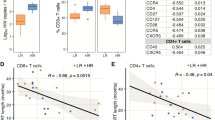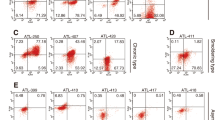Abstract
We established a simple IL-2-dependent colony-forming assay for T cells infected with human T-lymphotropic virus type-I (HTLV-I). IL-2-dependent cell lines were subsequently established by expanding individual colonies in liquid cultures. Lymphocyte-rich fractions were prepared from 31 HTLV-I carriers, 12 patients with smoldering ATL, 11 chronic ATL, 12 crisis ATL and 10 acute ATL. Primary colonies of CD4+ p19+ T cells were formed in all cases of carriers, smoldering and chronic ATL, and in 10 of 12 crisis cases. In contrast, no colony was formed from cells of patients with acute ATL. The rate of establishment of cell lines in HTLV-I carriers was significantly lower than that in patients of prodromal phase ATL. Cell lines established from cells of three prodromal cases were clonally identical to the parent ATL cells, while others had clonally distinct cell lines. Our results indicated the presence of four components of HTLV-I-infected T cells: (1) normal carrier T cells capable of forming colonies but not cell lines; (2) pre-malignant T cells capable of forming colonies as well as cell lines; (3) malignant T cells capable of forming colonies as well as cell lines; (4) fully malignant T cells unresponsive to IL-2. Our results suggest the presence of a multiclonal expansion of unique T cells in the prodromal phase of ATL, which have a high growth potential in response to IL-2. The coexistence of multiclonality with a dominant ATL clone may be closely related to the underlying pathology in HTLV-I leukemogenesis.
This is a preview of subscription content, access via your institution
Access options
Subscribe to this journal
Receive 12 print issues and online access
We are sorry, but there is no personal subscription option available for your country.
Buy this article
- Purchase on Springer Link
- Instant access to full article PDF
Prices may be subject to local taxes which are calculated during checkout
Similar content being viewed by others
Author information
Authors and Affiliations
Rights and permissions
About this article
Cite this article
Hata, T., Fujimoto, T., Tsushima, H. et al. Multi-clonal expansion of unique human T-lymphotropic virus type-I-infected T cells with high growth potential in response to interleukin-2 in prodromal phase of adult T cell leukemia. Leukemia 13, 215–221 (1999). https://doi.org/10.1038/sj.leu.2401271
Received:
Accepted:
Published:
Issue Date:
DOI: https://doi.org/10.1038/sj.leu.2401271
Keywords
This article is cited by
-
Aberrant expression of Fra-2 promotes CCR4 expression and cell proliferation in adult T-cell leukemia
Oncogene (2008)
-
Adhesion-dependent growth of primary adult T cell leukemia cells with down-regulation of HTLV-I p40Tax protein: a novel in vitro model of the growth of acute ATL cells
International Journal of Hematology (2008)
-
Small number of HTLV-1-positive cells frequently remains during complete remission after allogeneic hematopoietic stem cell transplantation that are heterogeneous in origin among cases with adult T-cell leukemia/lymphoma
Leukemia (2007)
-
Chemotherapy targeting methylthioadenosine phosphorylase (MTAP) deficiency in adult T cell leukemia (ATL)
Leukemia (2002)



